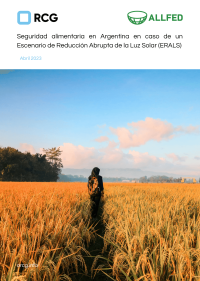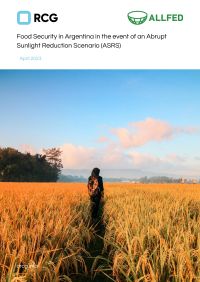

Policy Work at ALLFED
At ALLFED, we believe that building resilience into the global food system against catastrophic failures is critical for the present day and long-term future. However, governments, economies, and societies around the world are currently under-prepared for severe disruptions that could significantly impact food supply.
From 2024, ALLFED has established a dedicated Policy Team to significantly increase its resourcing on policy strategy, formulation, advocacy, and engagement.
ALLFED's policy strategy aims to address this urgent issue through targeted research, stakeholder engagement, and working towards the implementation of effective policy, planning, and investments.
Key strategic objectives
- Screening: Comprehensively analyzing opportunities for impact through scenario modeling and empirically grounded assumptions. This includes our country selection process for Abrupt Sunlight Reduction Scenario (ASRS) response plans.
- Stakeholder Mapping: Identifying and engaging with key partners, such as policymakers, researchers, industry leaders, and communities, to create momentum and alignment around building food system resilience.
- Stakeholder Engagement: Integrating stakeholder consultation throughout our planning and content delivery to ensure relevance, buy-in, and trust in our work. This includes developing tailored communication strategies.
- Narrative Balancing: Navigating complex policy landscapes and agendas by working with reliable partner organizations to frame our niche topics, such as ASRS preparedness, within broader priorities.
What does the successful implementation of ALLFED's policy strategy rely on?
At the country level, we aim to build preparedness and response planning into government policy through:
- Raising awareness of catastrophic food shock risks and incorporating them into disaster planning
- Implementing low-cost policy reforms to boost resilience
- Developing domestic capacity to advise and support food system actors post-disaster
- Facilitating public-private partnerships to pilot and scale up resilient food production technologies
- Forging international agreements and partnerships before disasters occur
ALLFED also considers the role of countries in influencing each other to adopt new resilience policies. For example, a given country may be far more tractable as a target for engagement after it has seen other countries take up our proposals. This acts to build momentum for our policy proposals.
We also seek to foster private sector collaborations to bring promising resilient foods to market, such as single-cell proteins, seaweed aquaculture, and other alternative protein sources. Capital investments and regulatory support for these foods can dramatically expand options to feed populations during a catastrophe.
Successful implementation of ALLFED's policy strategy relies on:
- Alignment with our Theory of Change
- Rigorous opportunity screening and risk management
- Targeted alliance-building to magnify our voice and build our reputation
- Flexibility in navigating diverse policymaking contexts
- Securing adequate resourcing for long-term engagement
We occasionally have new openings in our Policy Team, and are always on the look-out for talented interns, volunteers, and collaborators. Join our newsletter to stay up to date on our opportunities.
If you work in government, work closely with policymakers, or are an industry association interested in resilience policy, we want to hear from you! Please get in touch with us via our contact form.
Scenario-Specific Policy Recommendations
ALLFED has developed tailored policy recommendations to build food system resilience against high-impact disruption scenarios.
Key Strategic Objectives
- Global Catastrophic Infrastructure Loss (GCIL)
- Extreme Pandemics
- Abrupt Sunlight Reduction Scenarios (ASRS)
Key policy recommendations to prepare for and respond to prolonged infrastructure failures:
- Develop emergency plans for rationing and redistributing limited fuel and electricity.
- Research and pilot low-tech, decentralized food production and processing methods.
- Harden critical food system infrastructure against Electromagnetic Pulse (EMP) and cyberattack threats.
- Expand local and regional food reserves to provide buffers against supply chain shocks.
- Establish crisis communication systems to coordinate responses and quell panic.
While tailored to specific scenarios, these policy recommendations share common themes of supporting research and planning, investing in resilient practices and technologies, facilitating cooperation and communication, and creating safety nets to protect the most vulnerable. ALLFED looks forward to working with government and industry partners to refine and implement these policy priorities.
Key policy recommendations to bolster food system resilience to extreme pandemics:
- Stockpile and develop improved Personal Protective Equipment (PPE) for food system and infrastructure workers.
- Implement physical distancing and low-contact protocols for essential operations.
- Establish clear protocols for inter-regional and international food supply chains.
- Conduct multi-sector assessments and pandemic simulations to identify and address vulnerabilities.
Key policy recommendations for ASRS preparedness and response:
- Fund research on crop relocation and adaptation strategies for sudden global cooling.
- Invest in scaling up resilient foods (e.g., seaweed, single-cell proteins).
- Develop national and regional contingency plans for rapid crop transitions.
- Create market incentives and safety nets to enable swift farmer adaptation.

